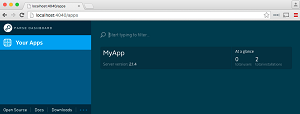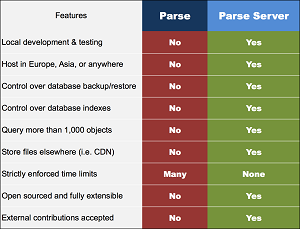News
Open Source Parse Dashboard Now Available
- By David Ramel
- March 7, 2016
An open source Parse Dashboard is now available for mobile developers seeking to transition their projects from the managed back-end service Parse.com, which is being shut down by parent company Facebook next year.
Facebook stirred up the mobile dev community in January when it announced the popular Parse Mobile Back-end-as-a-Service (MBaaS) it acquired in 2013 was being shuttered in a year's time.
Parse provides cloud functionality such as data storage, social log-ins, push notifications, app analytics and more services to work with mobile apps. Desktop, Web and embedded app services are supported also.
The news that Parse.com was being closed down next January gave rise to a lot of developer angst and myriad replacement pitches by vendors far and wide, including open source efforts to transition the technology to the community so developers can continue with familiar tools, led by the Parse Server project.
Last week, Parse offered to that community its new Parse Dashboard, based on a prototype it developed last December.
 [Click on image for larger view.]
The New Parse Dashboard (source: Parse)
[Click on image for larger view.]
The New Parse Dashboard (source: Parse)
"With the winding down of the Parse hosted service and the transition to the open source Parse Server, many of you have been asking how you will manage your app when it's running on your own system," Parse exec Drew Gross said in a blog post on Friday. "Today we are answering that question with Parse Dashboard. You can start using it today to manage the apps that you have already moved to Parse Server, your apps that are still on Parse.com, and your apps that are still in development and running on Parse Server on your development machine. You can even manage them all from the same dashboard."
The news came just a few days after Parse champion Fosco Marotto, who has been leading efforts to transition the technology to the open source community, penned his own blog post to convince developers the Parse Server project was worth their time and effort.
"The concept behind Parse has always been a simple one," Marotto said. "Abstract away almost the entire process, allowing a solo mobile developer to build the next great mobile app. For several years now, Parse has been the easiest and most comprehensive platform for mobile-focused developers. This is why so many people were upset when Parse announced the hosted service would be retired in one year."
The open source Parse Server requires a little more work on the part of developers to configure and use, Marotto indicated, noting that "hands-off" hosted services are available for those who prefer the completely managed approach.
"Since Parse Server is a self-hosted application, it does require you to take over some of the work Parse was doing," Marotto said. "For most apps, this is not a lot of work or complexity. There are already very simple one-click deployments and thorough guides available online. It takes about five minutes to get Parse Server running, either on your local machine or a cloud-based server. After just a few minutes, you're ready to start saving and querying data from your mobile app."
Marotto also outlined some ways that Parse Server is actually better than the hosted Parse.com service, shown in this graphic:
 [Click on image for larger view.]
Open Source Parse Server vs. Parse.com Managed Service (source: Parse)
[Click on image for larger view.]
Open Source Parse Server vs. Parse.com Managed Service (source: Parse)
"Parse Server, and all of the client SDKs, are free and open source," Marotto said. "More than that, we are actively engaging with everyone in the community to continue growing the Parse ecosystem. One month in, more than 40 contributors from around the world have committed code to Parse Server. The community has discussed features, reported bugs, and helped each other across almost 500 issues. More than 220 pull requests have come in, ranging from small fixes to large features, mostly from solo contributors but also large organizations like Microsoft and Amazon. People everywhere are jumping in to make Parse Server even better, easier to use, and easier to scale."
About the Author
David Ramel is an editor and writer at Converge 360.